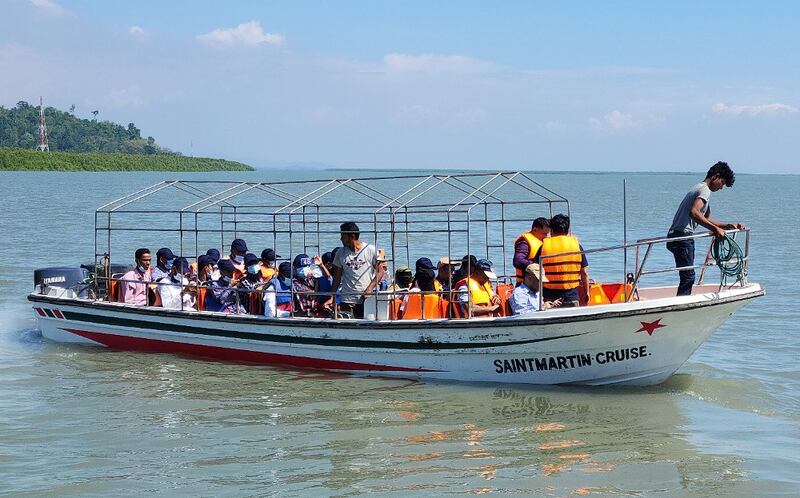Bangladesh-based Rohingya who were taken to Myanmar’s Rakhine state Friday to see preparations for refugee repatriation said they wouldn’t return without citizenship rights, recognition of their Rohingya identity, and a guarantee that they could resettle in their home villages.
Twenty Rohingya and seven Bangladeshi government officials traveled to Maungdaw township in northern Rakhine, where the Burmese junta had invited them to inspect preparations as part of a China-backed effort to repatriate a small portion of the 1 million Rohingya refugees sheltering in southeastern Bangladesh.
The delegation boarded a boat in the morning to cross the Naf River that separates Bangladesh’s Cox’s Bazar district from Rakhine, and returned on Friday evening.
Speaking to RFA-affiliated news service BenarNews when they got back, some Rohingya delegates expressed concern about temporary housing constructed in guarded camps. The group reached Maungdaw at around 10 a.m. and visited the Nagpura, Baulibazar and Kazirbil neighborhoods where Myanmar authorities have built makeshift camps with Chinese support.
“After many years, we got the chance to see our motherland. We visited Myanmar and we saw new camps there,” Rohingya Mohammad Selim told BenarNews. “We asked them – why the camps and for whom? They replied those were for us.”
Selim said the Rohingya want to return to their original homesteads, adding they did not find the camps to be safe.
About 740,000 Rohingya fled to Bangladesh from Rakhine following a Myanmar military crackdown against the Muslim-minority group in August 2017.
“We asked them what would happen to us if we do not get citizenship or if our safety is not guaranteed. In reply they said we must take national verification cards,” he said. “If we accept the card, it will mean that we are guests, but we are the residents, not guests.”
He said if Rohingya are not granted citizenship, they would not be able to own land in Myanmar.
“We have demanded that they return our homesteads and land. We will build our own houses on our land – unless we are given citizenship and our homesteads back, we will not return,” he said.

Another Rohingya, Abu Sufian, echoed Selim’s concerns.
“We visited many villages in Maungdaw. The Myanmar government built many IDP camps in the villages. In these circumstances, I do not see any possibility of returning there,” he told BenarNews, referring to camps for internally displaced persons.
Myanmar’s military council announced that 750 plots of land in 15 villages in the northern part of Maungdaw township had been prepared for the Rohingya repatriation. It announced that returnees were to be scrutinized and accepted before temporarily being placed in refugee camp for two months.
Rohingya Subia Khatun, who fled to Cox’s Bazar following the military crackdown, said she visited her old village.
“My green village has been converted into a fortified camp. I feel bad to see the makeshift houses. We will not go to the camps – we want to live in our villages,” Khatun told BenarNews.
Repatriation efforts
In recent months, Myanmar has shown interest in repatriating some Rohingya under a small pilot project.
A Myanmar delegation recently visited Teknaf in Bangladesh and identified more than 1,100 Rohingya for potential repatriation.
According to the agreement between the two countries, repatriation must be safe, voluntary and dignified. No Rohingya can be sent back forcibly.
“The arrangement is not bad at all. The enclaves are not IDP camps,” Mohammed Mizanur Rahman, Bangladesh’s refugee relief and repatriation commissioner who led the delegation to Rakhine on Friday, told BenarNews.
“The trip was for building the confidence of the Rohingya. A team from the Myanmar government is supposed to come to discuss issues, then we will decide about the repatriation.”

Aung Kyaw Moe, who advises Myanmar’s shadow National Unity Government (NUG) on Rohingya issues, questioned the military council’s repatriation efforts and said the refugees should focus on getting justice for the genocide they suffered.
Hundreds of Rohingya were killed by the military during clearance operations in 2017, forcing thousands to leave. The U.S. State Department has declared this is an act of genocide.
“The military junta has never had a good intention or goodwill toward the Rohingya. Nor will they have any in the future,” he told RFA.
Aung Kyaw Moe said the Myanmar military had failed in persuading Rohingya to return.
“They tried many times in the past, too but they did not succeed because the Rohingya have firsthand experience of the junta’s genocide against them and its inhumane violation of human rights and crimes against humanity. That’s why they will never come back unless justice is served for them.”
Nay San Lwin, co-founder of the Rohingya Liberation Coalition, said China had a big role in the repatriation effort.
“The military cannot refuse China’s pressure. On the other hand, some of China’s largest investments are in Bangladesh, too,” he told RFA. “Both countries are under a lot of pressure from China, therefore, they are trying to make this repatriation project happen due to China’s pressure.”
Spokesmen for the Myanmar junta and Rakhine state did not respond to RFA requests for comment.
Kamran Reza Chowdhury for BenarNews in Dhaka contributed to this report.
BenarNews is an RFA-affiliated news service.
